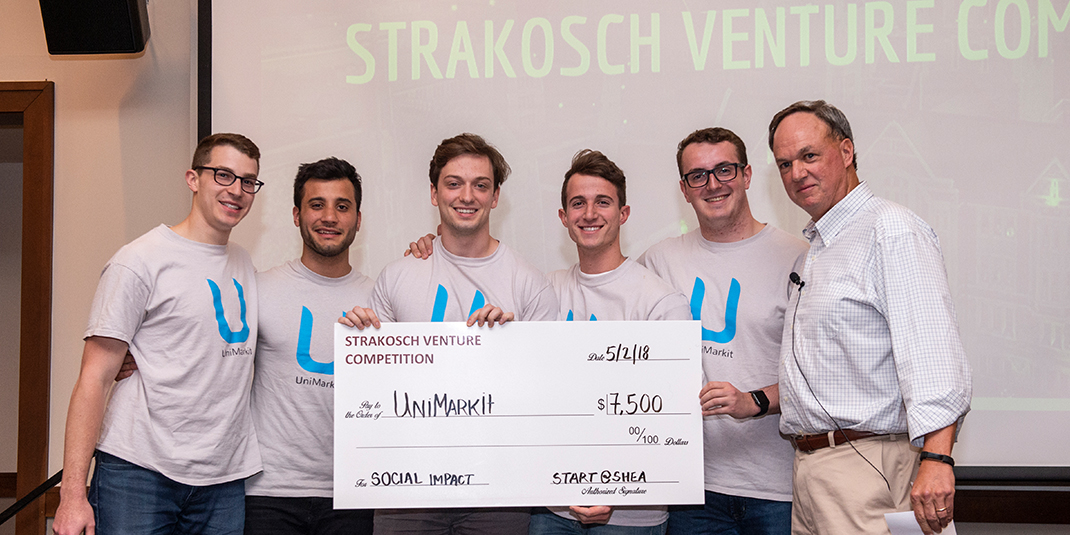It used to be that Boston College held a business plan competition—students pitched plans for hypothetical businesses, which might work out in the real world, or might not. Today, contestants in the newly named Strakosch Venture Competition are student startups that are already connecting customers with products and services. This year’s first-prize winner, Aryeo, has clients in Naples.
“These kids are incredible,” Greg Strakosch ’84, told a full Heights Room in early May before handing over the prize—a check for $15,000—to Branick Weix ’19, the founder of Aryeo, a software platform for real estate photographers.
The student entrepreneurs behind Aryeo as well as two runner-up companies (who received $7,500 apiece) and four other finalists presented their fully realized, active businesses to a crowd of their classmates and alumni. The event—which also featured a performance by Masti, Boston College’s Bollywood fusion dance troupe, and a “fireside chat” with Spark Capital co-founder Bijan Sabet ’91—wrapped up the year’s activities for the Edmund H. Shea Jr. Center for Entrepreneurship.
Weix is a finance and computer science student as well as a drone photographer who has used his skills to help scientists track endangered sea turtles. He founded Aryeo as a software solution to help photographers streamline the creation of online galleries, property websites, and Facebook ads.
The winners of the $7,500 prizes were UniMarkit and Trackster. Founded by information systems student Mark Dimeglio ’19, UniMarkit provides Boston College students with a safe and convenient way to buy and sell used furniture online. Unlike with Craigslist or Facebook, users must have a verified bc.edu e-mail address. Dimeglio plans to expand the concept to other campuses.
Trackster was co-founded by accounting and information systems student Jack Sexton ’18, and computer science major Emmett Scully, Morrissey ’18. They met on Boston College’s cross-country team, and their business concept was born of experience. Typically, running coaches time runs with a stopwatch, note the times on paper, and save them in Excel spreadsheets. Trackster integrates all that into a single app. Pitt, UNC, UMass, and Georgia Tech are just a few of the 100 teams already using Trackster.
The other finalists were no slouches. With EcoLiv, for example, Alexandra Kontopanos ’18, is seeking to shrink the environmental footprint of mid-market hotels by introducing water-soluble (and therefore zero-waste) shampoo and conditioner packaging. Jenness, co-founded by Will Dailey ’20, and Nick Bomleny, Morrissey ’20, is a clothing company with a mission to rid the ocean of the abandoned fishing nets that endanger whales and other sea mammals.
“It’s good to see a company with a porpoise,” quipped Quinn Kelly, Morrissey’18, the evening’s MC.
In all seriousness, the lineup of startups evinced the Boston College mission, said Greg Strakosch in his remarks. “Not only ‘ever to excel,’ but also to be a man or woman for others,” he said. “Think about how much good an entrepreneur can do for society. That’s why Peggy and I support entrepreneurship here.”
Peggy Strakosch ’85, Greg’s wife, is an active alum in her own right. She has served as co-leader of the Council for Women of Boston College’s Student Advisory Board, among other things, and this year the Alumni Association bestowed on her its highest honor, the William V. McKenney Award. The couple are also the parents of three Eagles: Tim ’14, Jack ’16, and Molly ’17.
Greg Strakosch recalled his reaction when Peter Bell ’86 first asked him to meet with Dean Andy Boynton ’78 about supporting a venture competition at Boston College. “I thought about the last time I met with a dean at BC, and it didn’t go so well,” he said, joking about his student days.
But the Strakosches did decide to support the competition that will now bear their name in perpetuity. And their early support was critical, said Boynton in his own remarks: “It’s easy to help out when something’s already gotten rolling, but Greg and Peggy stepped up at the beginning, when they were taking more of a chance.”
Taking chances, of course, is what entrepreneurs do, according to Strakosch. “Success is not guaranteed,” he said. “I’ve started two companies, and both times I said to my wife, ‘If it doesn’t work out, we’re broke.’ Both times she said, ‘You should definitely do it.’” Strakosch co-founded TechTarget, which he currently runs as chairman and CEO.
In the fireside chat, with moderator Tammy Lee ’19, Sabet shared the qualities that venture capitalists are looking for in a startup. “Does the founder have an extraordinary vision?” Sabet asks himself. “Is the product something I’m in love with? And could I imagine myself working there?”
Sabet also counseled students to have patience. “It’s good to be ambitious and to work hard and take risks,” he said, “but you don’t have to have your own startup in college. You can get experience and learn at a bigger company.
“There’s no one way to become an entrepreneur,” Sabet continued. “Some students I speak with already have their internships mapped out, down to the summer after sophomore year. I was a valet driver the summer after my sophomore year. And I didn’t even know how to drive stick.”



